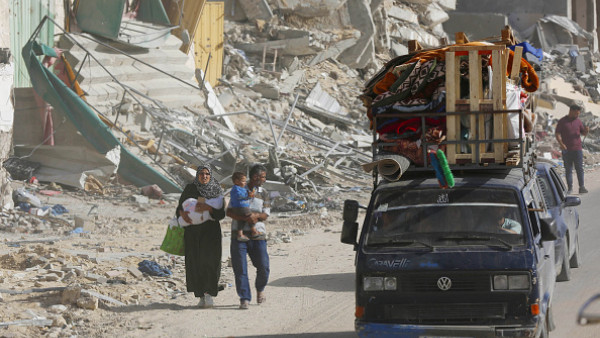In Rafah, some 600,000 children are currently seeking shelter, many in tents or informal and unstable housing. [Getty]
“We are escaping death in Rafah and rushing into hell in the central of Gaza and Khan Yunis,” these words are often said by anyone you meet in the Rafah city in the southern Gaza Strip.
For months, about 1.5 million people were displaced to the city of Rafah, forced to leave their houses and head to the southernmost territory of the besieged coastal enclave by the Israeli army.
“We thought that Rafah would be the last place we had to live in (…) the Israeli army is gambling with our lives and our children. We don’t even have the luxury of choice. For the past seven months, it forces us to do what it wants,” Um Ismail said to The New Arab.
The 42-year-old mother of six is desperately trying to evacuate her children by riding a donkey-pulled cart. She received a mobile tent from a charitable organisation, some mattresses and pillows, and a few kitchen utensils with her.
“I do not have time to stay here. I lost my husband during the time, and my children need me,” the woman said. “But I do not know where I should go(..) there is no safe place in all Gaza Strip.”
“Are we going to hell since no one can pressure Israel to stop its genocide against us? How long must we appeal to the Arab people and their presidents? How long will they watch us without adopting any real actions to protect us?” she added.
According to claims by Israel, their army aims to eliminate the remaining Hamas fighters present in the city, which Israel estimates to be four battalions.
Yet, as soon as Israel officially announced its expanded military operation and its invasion of the city, the army committed massacres of innocent civilians and indiscriminately targeted sites across the city without regard to the large number of refugees and civilians.
Israeli warplanes and tanks launch ground and air attacks, hitting civilian buildings and bringing several down on top residents, leaving dozens of victims, the majority of whom are children, according to statistics from the city’s Ministry of Health.
“I do not want to lose my children here in Rafah. But I do not have any other place to go. The only way that we have now is to seek shelter in the hell that is Gaza,” Mohammed Abu Shamallah, a Rafah-based displaced Palestinian, told TNA.
Over the past seven months, Abu Shamalah hosted around 100 displaced persons in his house. Today, Abu Shamallah and his guests must find another shelter in Khan Younis or central Gaza.
“For days, I have been trying to find empty land to establish tents there. I found nothing. Now, we are out in the open. We do not know where to go, nor we do not know if we will survive here,” the 52-year-old father of eight told TNA. “Israel is attacking us, killing, bombing and sweeping the city, and no one in the world has the honour to defend the oppressed in Gaza.”
Abu Shamalah, as well as likely all Palestinians in Rafah, is forced to evacuate it as soon as possible.
About 100,000 Palestinians have already evacuated Rafah, seeking shelter elsewhere, according to the UN Children’s Agency (UNICEF).
“The escalation of hostilities in the Gaza Strip is having a catastrophic impact on children and families. Children are dying at an alarming rate – more than 13,000 are reported to have been killed in this current conflict, and thousands more have been injured,” the UN agency said in a press statement.
“Around 1.7 million people in the Gaza Strip are estimated to be internally displaced – half of them children. They do not have enough access to water, food, fuel, and medicine. Their homes have been destroyed; their families torn apart,” it added.
In Rafah, some 600,000 children are currently seeking shelter, many in tents or informal and unstable housing.
Many Palestinian families, mostly with children, have been displaced several times, losing homes, loved ones, and parents in the process.
“The Palestinians need to be protected, along with the remaining services that they rely on, including medical facilities and shelter,” UNICEF stressed.
Currently, Israel has launched what more or less is an invasion of all of Rafah‘s neighbourhoods by air and artillery bombardment, sealing the Rafah and Kerem Shalom crossings and halting the movement of aid supplies, according to the Geneva-based Euro-Med Human Rights Monitor.
“During the displacement process, the displaced are left homeless and in a devastating reality without services,” the Euro-Med said.
“The failure to enter fuel supplies and its depletion from stores will lead to the cessation of humanitarian efforts in Gaza within days and will have serious repercussions on the work of hospitals, ambulances, and rescue services, which are already operating partially,” the organisation added.


